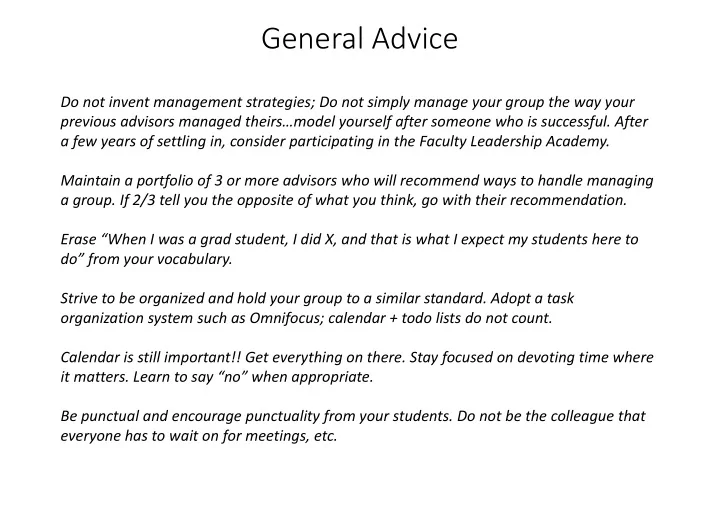

General Advice Do not invent management strategies; Do not simply manage your group the way your previous advisors managed theirs…model yourself after someone who is successful. After a few years of settling in, consider participating in the Faculty Leadership Academy. Maintain a portfolio of 3 or more advisors who will recommend ways to handle managing a group. If 2/3 tell you the opposite of what you think, go with their recommendation. Erase “When I was a grad student, I did X, and that is what I expect my students here to do” from your vocabulary. Strive to be organized and hold your group to a similar standard. Adopt a task organization system such as Omnifocus; calendar + todo lists do not count. Calendar is still important!! Get everything on there. Stay focused on devoting time where it matters. Learn to say “no” when appropriate. Be punctual and encourage punctuality from your students. Do not be the colleague that everyone has to wait on for meetings, etc.
Recruiting Grad Students & Postdocs What strategies have you found to be effective for recruiting great folks to your lab, especially if you’re a relatively new (unknown) faculty member? Contact every admitted student and offer to meet with them, consider taking them • each out for coffee or lunch. Your current group is your most influential recruiting tool. • Where should one advertise? I don’t really advertise directly, but I make sure to maintain a current website, which is • the #1 way students look for PIs. My field is tightly networked, and my subfields are well-represented on two linking sites: organiclinks.net; chembiolinks.net Give lots of seminars. See if your department will pay for recruiting seminars. • What do you look for in a CV? Research experience in the area needed for the project which should be bolstered by • one or more rec letters; GPA (higher=generally more organized, able to meet deadlines, follow directions etc; co-authorship on a publication a bonus. https://gradhub.ucdavis.edu Do you interview folks? What do you ask about? Yes, during the visitation (after admission) and again after they arrive. Also solicit • feedback from current group members. Describe current project “at the board”, answer a science question related to project •
Recruiting Undergrads Should one recruit undergrads ? Yes, if necessary. My department has 800 majors, >200 of whom are doing research, so • they are constantly contacting me. Upper division classes are excellent for recruiting. When are they useful and when not? Useful when paired effectively with a grad student or postdoc to work on an • established project. Not (generally) useful to launch a new project. How does undergrad mentoring help your dossier? Helps generally and also puts you in a good position to help your department get other • grants (NSF-REU, Beckman, etc). Additional Points Require them to apply for PUF grants • If they are URM, work with the URC to get them into a URM-specific program • (MURPPS, CAMP, etc). Require them to present (talk, not poster) at one or more conferences, including a • local one.
Managing Expectations After you recruit folks, what steps should one take to support them in being successful? Have a formal meeting to discuss expectations, monitor progress carefully, provide • immediate feedback if expectations are not being met and praise if they are. “Praise publicly, criticize privately”…good advice I got from a co-worker. • Do you have written agreements, mentoring plans, etc.? Yes. Got one from a very successful PI at another school and adapted to suit my needs. • Have you ever had things go really wrong in your lab? How do you handle that? What resources, if any, were helpful? Have you ever had to terminate someone? Why and how? Not really...I have had two grad students (out of >20) leave my group, and in each case • I was on the brink of dismissing them. I have had to terminate an undergraduate and involvement of URC staff was very helpful. Additional Points Maintain a formal and professional atmosphere; err on the side of ”bossiness” rather • than friendliness. Deliver on your promises (and threats) as needed. Remind your students (as needed) that failure to meet your agreed-upon expectations will have consequences.
Recommend
More recommend